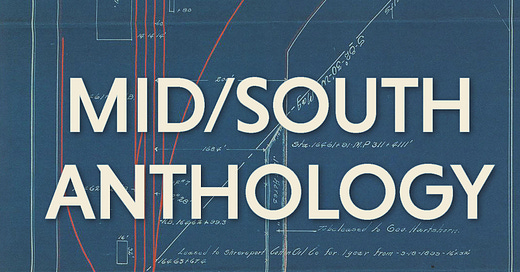Mid/South Contributors: Scott Morris
Learn more about one of the fiction writers in our first anthology
I don’t have firsthand experience writing historical fiction, but I have a lot of respect for the imagination and restraint that it takes to do it well. Scott Morris’s short story, “The Industry, 1838,” is an excellent example of how these faculties can work together in powerful ways to reimagine one individual’s experience of our region’s cultural history. Read on to learn more about Scott—and if you’re in the central-Arkansas area, join us on October 4 at UCA to hear him read alongside other anthology contributors! More details on that to come soon.
Name: Scott Morris
Current Location: Little Rock, Arkansas
Twitter: @ScottLMorris
Bio: Scott Morris has a Master of Fine Arts in Creative Writing from the University of Arkansas and has published short fiction in The Texas Review and other journals. He has worked as a newspaper reporter in three Southern states and done stints in politics, international development, and corporate communications.
1. Is there anything else you’d like us to know about your work that will appear in the anthology?
I want to thank Dr. Daniel F. Littlefield Jr., director of the Sequoyah National Research Center at the University of Arkansas at Little Rock, for patiently answering my questions about the Arkansas segment of the Trail of Tears and the Native North Americans who traveled it.
2. How does the Mid-South and/or larger Southern region influence your perspective (personally and/or in your writing)?
The Mid-South, at least as I define it, is often overlooked, disregarded, unimagined. Arkansas, Oklahoma, Northeast Texas, Northern Louisiana, Eastern Tennessee, Southern Missouri—we don’t rise to the level of flyover country. We lack the magnolia scent of the Deep South, the cowboy glamor of the West, the glitz sprinkled like fairy dust on the brilliant coasts. We can’t even boast the stolid heartland ethos of the Midwest. What we have always been is reliably dull. Who would update King Lear and lay it in the piney woods of South Arkansas? Maybe you could set your scene on the streets of Memphis, but I’m inclined to doubt it. Anyway, the truth is that, like people everywhere, we can be beautiful, ugly, inspiring, and demoralizing—usually all at once, and usually twice before lunch. What we can’t do worth a damn is dramatize ourselves. The ones who can, they mostly leave us behind. Although, lately, we seem to be losing some of our well-earned, stiff-necked modesty. We’re rattling the bars of our backwoods cage, mischief on our minds. We ply the Internet, rage at Cable News, and form opinions about Important Matters. Now and then we even venture into the Great Cities to express our views in ways that can be hard to ignore. That’s probably not a good thing, not for us and not for those of you living your lives in Twenty-first Century America. We were better when we were dull.


